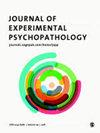Approach and Conquer: Optimizing Fear Extinction by Adding Approach?
IF 1.9
4区 医学
Q4 PSYCHIATRY
引用次数: 0
Abstract
Exposure treatment involves systematic confrontation with fear-inducing stimuli, effectively reducing fear and anxiety. However, a significant number of clients still experience a return of fear (ROF) after treatment. This study investigates whether incorporating an approach component during fear extinction, a laboratory exposure analog, could mitigate this return of fear. Furthermore, we explored the underlying mechanisms by drawing on predictions from the inhibitory learning theory and the reflective-impulsive model of behavior. In a within-subjects design, we compared instructed active approach of a stimulus during extinction to more passive non-avoidance. Contrary to expectations, our findings revealed that performing approach behavior during extinction did not reduce ROF when compared to non-avoidance. Furthermore, valence and action tendencies, which were potential mechanisms based on the reflective-impulsive model of behavior, remained unaltered. Still, a noteworthy discovery emerged in the form of increased threat expectancies for the approached stimulus during extinction, suggesting a heightened level of expectancy violation, as predicted on the basis of the inhibitory learning theory. These findings offer valuable insights into the intricate relationship between approach behavior, ROF, and underlying mechanisms, highlighting the need for further research to assess the potential benefits of emphasizing approach in exposure treatment.接近与征服:通过增加 "接近"、"征服"、"征服 "和 "征服 "的方法优化恐惧的消除?
暴露疗法包括系统性地面对诱发恐惧的刺激,可有效减少恐惧和焦虑。然而,相当多的患者在治疗后仍会经历恐惧回归(ROF)。本研究探讨了在恐惧消退(一种实验室暴露模拟)过程中加入接近成分是否能减轻恐惧回潮。此外,我们还借鉴了抑制性学习理论和反思-冲动行为模型的预测,探索了其潜在机制。在一个被试内设计中,我们比较了在消退过程中主动接近刺激和被动不回避刺激。与预期相反,我们的研究结果表明,与不回避相比,在消退过程中进行接近行为并不会降低ROF。此外,基于反思-冲动行为模型的潜在机制--情绪和行动倾向--仍然没有改变。不过,一个值得注意的发现出现了,即在消退过程中,对接近刺激的威胁预期增加了,这表明预期违反的程度提高了,正如抑制性学习理论所预测的那样。这些发现对接近行为、ROF 和潜在机制之间错综复杂的关系提供了有价值的见解,强调了进一步研究的必要性,以评估在暴露治疗中强调接近的潜在益处。
本文章由计算机程序翻译,如有差异,请以英文原文为准。
求助全文
约1分钟内获得全文
求助全文
来源期刊

Journal of Experimental Psychopathology
Medicine-Psychiatry and Mental Health
CiteScore
2.00
自引率
0.00%
发文量
19
审稿时长
11 weeks
期刊介绍:
The Journal of Experimental Psychopathology (EPP) is an open access, peer reviewed, journal focused on publishing cutting-edge original contributions to scientific knowledge in the general area of psychopathology. Although there will be an emphasis on publishing research which has adopted an experimental approach to describing and understanding psychopathology, the journal will also welcome submissions that make significant contributions to knowledge using other empirical methods such as correlational designs, meta-analyses, epidemiological and prospective approaches, and single-case experiments.
 求助内容:
求助内容: 应助结果提醒方式:
应助结果提醒方式:


